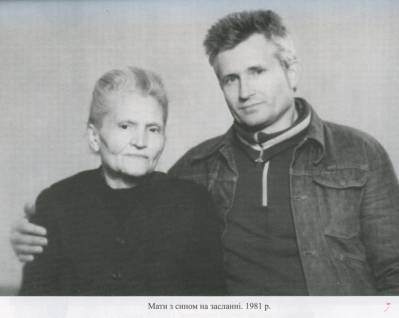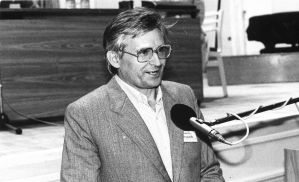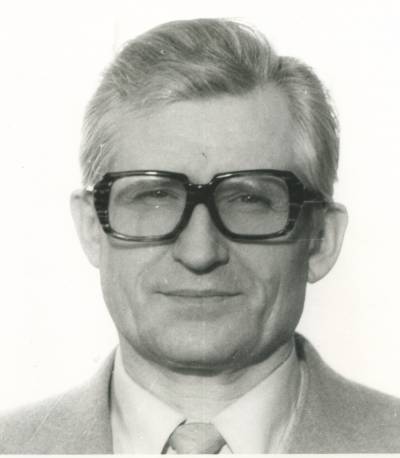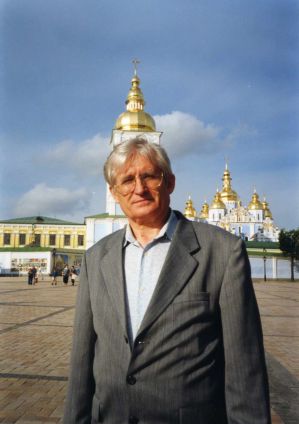SERHIYENKO Oles (Olexandr) Fedorovych
 3024
3024
автор: Vasyl Ovsiyenko
(b. 25.06.1932, Village of Tiotkino, Glushkovskiy Region Kursk Oblast, Russia--died on 24.09.2016, Kyiv)
Member of the Sixtiers’ Movement, social and political activist.
He was born into the nationally-minded family of teachers in Dnipropetrovsk (now Dnipro). His mother Meshko Oksana Yakivna was a chemical engineer born in Stari Sanzhary Village in Poltava Oblast into a large Kozak family, which had fought against both tsarist and Bolshevik regimes and had been actually subjected to repression. His father Serhiyenko Fedir Fedorovych was an economist from Huliaipole Region, Zaporizhzhia Oblast, member of the Ukrainian Communist Party (Borotbists) banned by the Bolsheviks in 1924; he was imprisoned in 1924 and in 1934 and had to emigrate to Tambov. There, the family lived from 1936 to May 1944… During the war, his father was drafted into the army. On 25.11.1941, a German bomb killed his 12-year brother Yevhen.
In summer 1944, the mother and her son Oles returned to Dnipropetrovsk to his grandmother and in January 1945 they moved to Kyiv, where his father after the hospital and demobilization worked as a revenue inspector.
In summer 1946, the family was joined by his mother’s elder sister Vera Khudenko orphaned during the war; the latter was a mother and wife to the members of OUN underground in Rivne Oblast. She was soon arrested; on 19.02.1947 O.MESHKO, who tried to stop the relentless punitive machine with the help of lawyers, was arrested as well. The Special Council sentenced both of them to ten years of imprisonment in concentration camps for alleged intention to assassinate M. Khrushchev. In September, Oles and his grandmother had a half-hour meeting with his mother before her transportation. Later he and his grandmother were evicted from their miserable home by authorities.
In 1950, S. graduated from the Kyiv High School no. 92 and the same year entered the Kyiv Agricultural Institute. In 1951, he buried the grandmother Mariya. He lived in a tiny room into which only a bed could be hardly fit.
In 1953, due to the evidence given by his friend, he was for the first time made accountable by the MSS in the case of the circle of students-philologists and only Stalin’s death saved him from imminent arrest.
In May 1956, S. was summoned to the KGB regarding the provocative letter from a jail written by his school friend entitled "What is to be done?" They could not make him accountable after the the Twentieth CPSU Congress, but the session was disrupted and he had but to leave after the fourth academic year. Then, in June 1956, his mother returned from prison and was rehabilitated. He worked as a mechanical engineer. He and his mother began to build a khata. In December 1958, his father died.
In 1963, S. entered the Kyiv Medical Institute. This was the beginning and flourishing of the movement of the Sixtiers, in which S. took an active part. In April 1965, he took part in the discussion of the Ukrainian Literature Circle at KSU; he joined the organizing committee of the permanent debate about the Ukrainian language and culture, which was disbanded with repressive methods. On 28.05.1966, for trying to get to the Ivan Franko Memorial Event in Kyiv together with M.KHOLODNYI he was arrested for 15 days. In 1967, S. was expelled from the institute. On May 22, 1970, near the Monument to Taras Shevchenko, S. called on amateurs of the poet to stay after the official festival and read his poems. S. actively distributed samvydav literature.
In 1970, S. married Zvenislava Vivchar. His son Ustym was born in 1971, daughter Olga in 1981.
From 1965 the mother of S. also joined the Sixtiers, who radicalized themselves at the time. On 1-2.06.1970, in their house, the search was carried out in the case of V.Moroz and their archive was taken away. On 07,12.1970, S. spoke at the funeral of the murdered artist A.HORSKA giving a broad hint about the culprit, the KGB. As a result of this, he was sacked.
In early 1972, the authorities delivered a blow to the Ukrainian national movement which was more powerful than in 1965. S. was also arrested on 12.01.1972. He, in particular, was accused of editing the treatise of І.DZIUBA Internationalism or Russification? On 22-23.06.1972, S. was sentenced under part 1 of art. 62 (“anti-Soviet agitation and propaganda”) to 7 years in jail and 3 years in exile.
In early December 1972, S. was transported under guard to the Perm strict security camp VS-389/36 in the Village of Kutchino, Chusovskaya Region. He took part in the protests. After several lockdowns in a punishment cell, in March 1973 he spent six months in a solitary-confinement cell. On 31.12.1973, right in the watchman room S. was sentenced to 3 years in prison. On 20.01.1974, he was brought to the Vladimir Central OD-1 / st-2. His mother launched a campaign to protect her son. She became a founding member of the Ukrainian Helsinki Group (09.11.1976) and after the arrest of its head M.RUDENKO (05.02.1977) she headed the Group.
In January 1977 S. was taken back to Kutchino, where he fell ill with bronchitis. On 11.03.1977, a militia agent from Kyiv in white overalls instead of Mantoux test did him IV injection of live tbc virulent culture. In June 1977 his mother and wife called for help to "Save Olexandr Serhiyenko!” In August S. underwent treatment in the medical unit of the zone no. 36 for thrombosis of the right leg. God worked a miracle and the blood clot bypassed his heart and brain.
On 23.02.1979, S. was brought under guard in exile into the Village of Ayan on the shore of the Okhotskoye Sea, Khabarovsk Krai. In July of the same year he was visited by his wife and mother. On 7.10 S. applied to L. Brezhnev demanding to let him and his family go abroad for treatment. The only response was the full examination at Khabarovsk hospital.
Meanwhile, the brutal persecution of his mother went on. On 06.13.1980, O.MESHKO was hospitalized for 75 days in a psychiatric hospital, and on 13.10, as a person of a sound mind, she was arrested. On 5-7 January, 1981, with a special cynicism, at Christmas, the Kyiv City Court sentenced 76-year-old woman under art. 62 part 1 of the Criminal Code of the UkrSSR “anti-Soviet agitation and propaganda” to 6 months of imprisonment and 5 years of exile. The transportation took 108 days: on 03.07.1981 they brought her to her son in Ayan and put both of them to a difficult choice. Indeed, on 03/28/1981, his wife gave birth to their daughter Olga and after childbirth she took to her bed. Mother ordered him, “Go home, sonny, and rescue our family.” On 19.10.1981, he stored up firewood for winter and repaired their khata, and then jumped on the last ship before the end of the navigation. He arrived in Kyiv on 3.11.
S. worked as a worker at the concrete products plant, and at the sawmill in the woodworking shop.
In March 1982, he visited in Khabarovsk his mother, who was undergoing examination in the clinic (he could not see her in the closed zone of Ayan). The mother returned to Kyiv on 05.11.1985, participated in public works, and died on 02.01.1991; she died on the 86th year of life.
In 1990-1991, S. worked in the URP secretariat.
In 1991, S. was social defender of arrested S.KHMARA in connection with which he was charged with violent resistance to militiamen on 20.07.1991 (art. 188-1 of the CC of the UkrSSR). He was released on 25.08.1991 in connection with the approval of the Act of Independence of Ukraine.
In 1990 and 1994, S. ran to the Verkhovna Rada at Pechersk constituency; he won the elections, but through the fraud of authorities he failed to receive his mandate. In 1990-94 he was the deputy of Pechersk District Rada working in the department of culture. In 1994 he was elected a deputy of Kyiv City Rada and worked in the Commission for the renewal of rights of rehabilitated and commission on education, self-management and public relations with media. In 1994, at age 62, he graduated from the Institute of Public Administration, Master of "Law and Politics". He worked in the Commission on the renewal of rights of rehabilitated in the Kyiv City Rada.
Since 1995, he headed the Ukrainian Christian Democratic Party, which in 2001 joined the URP.
Bibliography:
І.
На межі. – Наука і суспільство, № 9-10, 2000. – Вересень. – С. 34-42. http://archive.khpg.org/index.php?id=1460818318&w
Штрихи до портрета. З виборчої програми. Програма дій. – Українське слово, №11 (2707), 1994. – 17 березня.
Терміну давності за такі злочини немає. // Десять років роботи комісії Київради з питань поновлення прав реабілітованих. Київ, 27-28 квітня 2001 року. – К.: Ватра, 2001. – С. 9-15.
Оксана Мешко. Не відступлюся! До 100-річчя з дня народження. / Харківська правозахисна група; Упорядкували В.В.Овсієнко та О.Ф.Сергієнко. Художник-оформлювач Б.Є.Захаров. – Харків: Фоліо, 2005. – 300 с., фотоіл. (Передмова „На грані”, с. 5 – 15).
ІІ.
Український правозахисний рух. Документи й матеріяли УГГ. – Торонто–Балтимор: “Смолоскип”, 1978. – С. 15, 16, 65, 74, 78, 90, 94, 130, 142, 170, 211-214, 229, 398, 406.
Вісник репресій в Україні. Закорд. предст-во УГГ. Ред.-упоряд. Н. Світлична. Нью-Йорк. 1980–1985 рр. – 1980: 1-27, 6-1; 1981: 1, 3, 4, 5, 11; 1982: 4-30; 1984: 11-28.
Інформаційні бюлетені УГГ. Вип.: 1978 – 1980 рр. – Торонто – Балтимор: “Смолоскип”, 1981. – С. 14, 15, 28, 48, 49, 81, 117, 124, 126, 131, 163.
Українська Гельсінкська Група. 1978 – 1982. Документи і матеріяли. Упрядкував і зредагував Осип Зінкевич. – Торонто – Балтимор: “Смолоскип”, 1983. – С. 40, 41, 467-470, 472, 481, 491, 746, 749, 754.
Світлана Синякова. Арешт по-змопівськи. – Вечірній Київ, № 138 (14253), 1991. – 22 липня.
В.Овсієнко. За ґратами Олесь Сергієнко. – Самостійна Україна, 1991, №10. – Серпень.
За ґратами Олесь Сергієнко. Хто далі?.. – Тернистий шлях (Тернопіль), 1991. – Серпень.
Касьянов Георгій. Незгодні: українська інтелігенція в русі опору 1960-1980-х років. – К.: Либідь, 1995. – С. 28, 86, 129, 147, 161.
Ю. Данилюк, О. Бажан. Опозиція в Україні (друга половина 50-х –80-і рр. ХХ ст.). – К.: Рідний край, 2000. – С. 31, 83, 107, 198.
Кондрацький А.А. Оксана Мешко (1905-1991) та Олесь Сергієнко; Його ж: Часопис київського політрепресанта (коротка історія Київського Товариства політв’язнів та жертв репресій (1988-1999). – К.: Стилос, 1999. – С. 56–71; 2001. – С. 63-77; 2003. – С. 60-72.
Українська Громадська Група сприяння виконанню Гельсінкських угод: В 4 т. / ХПГ; Упоряд. Є.Ю.Захаров; В.В.Овсієнко – Харків: Фоліо, 2001. – Т. 1. – С. 34, 114, 115; Т.2. – С. 27-28, 35, 39-40, 47, 50, 76, 11, 117, 124-125; Т. 3. – С. 29, 68, 74, 87-88, 95, 108-109, 121-122, 204; т.4. – С. 8-10, 13-15, 19, 22, 48-50, 63, 86, 142, 180, 185, 192-193.
Інтерв’ю О.Сергієнка В.Овсієнку 4 і 6.01.2000 р., 26.07. 2006 р.
Рух опору в Україні: 1960 – 1990. Енциклопедичний довідник / Передм. Осипа Зінкевича, Олеся Обертаса. – К.: Смолоскип, 2010. – С. 581–583; 2-е вид.: 2012 р., – С. 662–663.




Вас може зацікавити
Dissidents / Ukrainian National Movement
RIZNYKIV (RIZNYCHENKO) Olexa Serhiyovych. Vasyl Ovsiyenko
Dissidents / Ukrainian National Movement
KHOLODNYI Mykola Kostiantynovych. Vasyl Ovsiyenko
Interviews
May 22, 1967. Volodymyr PETRUK & Oleg ORACH. Vasyl Ovsiyenko
Interviews
OVDIYENKO Mariya Hryhorivna. Vasyl Ovsiyenko
Interviews
CHORNOMAZ Bohdan Danylovych. Vasyl Ovsiyenko
Interviews
MARYNOVYCH Myroslav Frankovych. Vasyl Ovsiyenko
Interviews
RUDENKO Rayisa Opanasivna. Vasyl Ovsiyenko
Interviews
MARMUS Volodymyr Vasyliovych. Vasyl Ovsiyenko
Interviews
RUSYN Ivan Ivanovych. Vasyl Ovsiyenko
Interviews
OVSIYENKO Vasyl Vasyliovych. Borys Zakharov
Interviews
POPADIUK Zorian Volodymyrovych. Vasyl Ovsiyenko
Interviews
APANOVYCH Olena Mykhailivna. Vasyl Ovsiyenko
Glossary
ARRESTS OF THE UKRAINIAN INTELLIGENTSIA 1972 – 1973
Dissidents / Democratic Movement
DONYCHENKO, Yevhen Hryhorovych
Dissidents / Ukrainian National Movement
RUDENKO (KAPLUN), Rayisa Opanasivna


